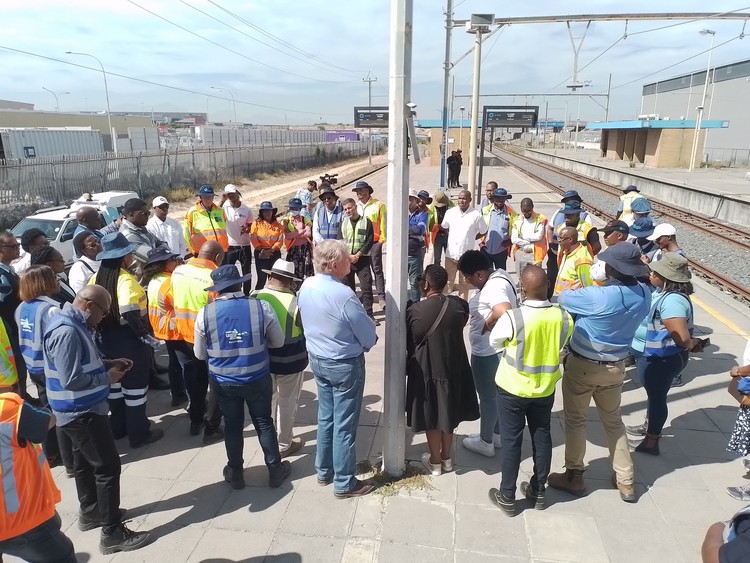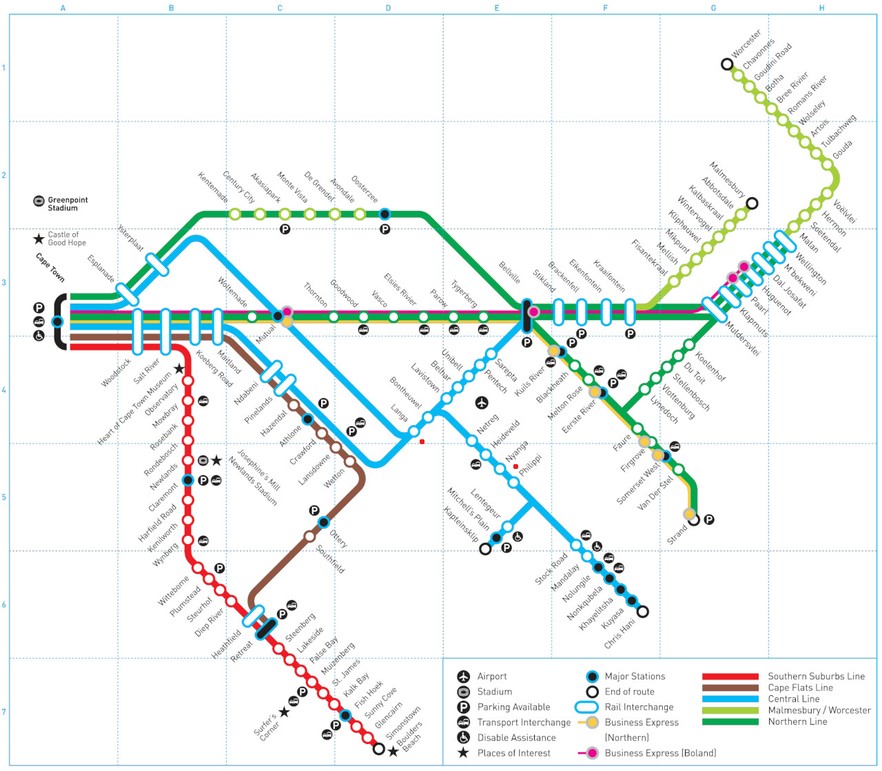Railway line occupiers complain to Parliamentarians about lack of water
SCOPA hears of the substantial obstacles blocking the reopening of Cape Town’s Central Line
SCOPA visited stations along Cape Town’s Central Line on Wednesday. Khayelitsha station is pictured here. Photo: Sandiso Phaliso
- Parliament conducted an oversight visit of Cape Town’s railway occupations, and relocation sites, on Wednesday.
- Leaders of the households who have been moved off Metrorail’s Central Line complained of a lack of water provision and refuse collection.
- The City of Cape Town claims it is in fact delivering water and collecting refuse regularly, but the deputy-mayor said he would investigate the complaints.
- Thousands of households continue to occupy Metrorail’s Central Line, and the obstacles to fully reopening it are considerable.
Parliament’s Standing Committee on Public Accounts (SCOPA) conducted an oversight visit of Nyanga, Philippi, and Khayelitsha train stations on Wednesday. SCOPA also visited the Stock Road train station site to which almost 900 families who previously occupied parts of Metrorail’s Central Line in Nyanga and Philippi, have been relocated since December.
The visit comes as Metrorail hopes to further open the Central Line to Khayelitsha and Mitchells Plain by April this year.
The Central Line to Khayelitsha and Mitchells Plain has not been fully functional for more than four years due to vandalism, theft of infrastructure, and occupation of the tracks and rail reserve owned by the Passenger Rail Agency of South Africa (PRASA). Households which occupied the tracks in Langa have been temporarily shifted to open spaces within Langa, while households occupying the line in Philippi and Nyanga have been temporarily relocated to PRASA-owned land next to the Stock Road train station.
During the SCOPA visit, representatives of the families living at the Stock Road site complained that the City of Cape Town has not delivered on their promise to install standpipes for water provision. They also complained about problems with refuse collection, insufficient toilets, and that electricity has not been provided. They also called on the City to hire more janitors to clean the toilets that have been provided.
Zanele Ngcobondwana, the elected spokesperson for the Stock Road households, told SCOPA chairperson Mkhuleko Hlengwa that the City only supplied water via water tankers twice a week. They also want water provided on weekends.
Ngcobondwana said on Monday residents “chased” a water truck away after “discovering that the water was murky and had a bad taste”.
Another community leader, Nyameka Mabandla, the widow of the late activist Loyiso Nkohla who was gunned down last year, said residents had been hospitalised because the water was contaminated. (GroundUp is unable to verify this claim.)
Mabandla said the almost 900 families were supplied with only 7,000 litres of water per week.
She said in order to make their concerns heard, the residents had to protest and block the R300, one of the city’s main thoroughfares.
The City stated water is being delivered by tanker three days a week. The 700 litre tanker makes three to five visits on days that it delivers. The City further stated it provides waste collection “two to three times a week”. The City also stated there were not bulk services provided as the land was not currently zoned for residential purposes. “Thus there is no alternative but to provide water with the water tankers.”
Nevertheless, Cape Town deputy mayor Eddie Andrews said he will investigate the claims about lack of water provision and waste collection.
The households were moved to the Stock Road site as part of Operation Bhekela, a joint venture between PRASA, the City, the Housing Development Agency (HDA), and the provincial and national governments to restore Metrorail’s lines in Cape Town and surrounding areas.
There are currently still more than 1,200 people occupying the rail reserves in Langa. The land for their relocation has been identified at a site known as the Philippi Wedge, situated between Mitchells Plain and Philippi’s Siqalo informal settlement.
A rezoning application for this land was lodged with the City in August 2023. The permanent relocation of the Langa families is dependent on the outcome of this application, which is expected to be finalised this financial year.
This is Metrorail’s map for Cape Town. (Like most commuter rail maps it’s not to scale.)
At the oversight visit, Metrorail regional manager Raymond Maseko told Hlengwa that the electrical cabling in Philippi train station and beyond to Khayelitsha and to Mitchells Plain has been stolen, along with sections of the actual railway line.
He said the branch line to Kapteinsklip via Mitchells Plain has also been stripped of electrical cabling.
Stations beyond Nyanga, including Philippi, have been vandalised and stripped. Maseko said work on these lines had started to recover the section of the lines.
There are still thousands of people occupying the marshalling yard adjacent and south of the Metrorail train station in Philippi. Moving them will be a difficult undertaking, both legally and logistically.
Briefing the media, Maseko said Metrorail was busy recovering the Central Line and by April there will be trains operating up to Nolungile train station in Khayelitsha.
Metrorail has begun restoring infrastructure beyond Philippi train station.
He said it was important that the City meet its obligations towards the households that have been moved. “If they need water, give them water so that we can get past this and move to other things,” said Hlengwa. But he acknowledged the problems between the City and the residents were primarily about communication.
“It is just [a matter of] talking to each other to say that the water tanker has not arrived. It is about creating the lines of communication to make sure it arrives. It is incumbent for the City to meet its obligations,” said Hlengwa.
Next: Water: government is failing to realise this human right
Previous: Action threatened against unregistered school that charges R850 per month
© 2024 GroundUp. This article is licensed under a Creative Commons Attribution-NoDerivatives 4.0 International License.
You may republish this article, so long as you credit the authors and GroundUp, and do not change the text. Please include a link back to the original article.
We put an invisible pixel in the article so that we can count traffic to republishers. All analytics tools are solely on our servers. We do not give our logs to any third party. Logs are deleted after two weeks. We do not use any IP address identifying information except to count regional traffic. We are solely interested in counting hits, not tracking users. If you republish, please do not delete the invisible pixel.




